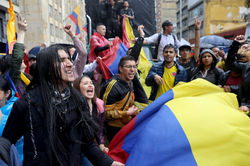
Protest in Colombia: Create, Write, Publish and Update your own Protest Blog! Support your Favorite Colombian Cause Online, Protest Injustice, Inequality, and Non-transperency
Since mid-November of 2019, hundreds of thousands of Colombians have taken to the streets across the country in the largest anti-government protests the country has seen in decades. The issues are myriad, with labor unions taking the lead in the strikes with widespread support and independent action of an equally large number of groups, students in particular, retired people, and indigenous groups. What they are all opposed to is basically the policies of the right-wing government of Ivan Duque.
Towards the end of 2019, Colombia has seen numerous marches, curfews, and tear gas, with looting taking place throughout Colombia's cities since the protests began. Protestors want the President to step down or make radical changes to address his government's weak implementation of the 2016 peace deal and issues related to economic reforms and corruption.
Climate change is an issue in these protests, and a cleaner, more green public policy that caters more to indigenous people living in the jungle than it does to large corporations extracting Colombia's natural resources and poisoning the land, water, and air as a result.
Discontent in Colombia was simmering throughout 2019 as the country witnessed an increase in violence against indigenous and social leaders, which has been blamed in part on Duque's slow implementation of the 2016 peace deal with the Revolutionary Armed Forces of Colombia (FARC), which had been signed during the previous administration. All of this combined with the energy sweeping across other Latin American countries experiencing unrest, prompted student, indigenous, peace groups and others to also protest their conditions and seek the creation of a more just social order.
 |  |  |
|---|---|---|
 |  |  |
 |  |  |
 |  |  |
 |  |  |
 |  |  |
 |  |  |
 |  |  |



















